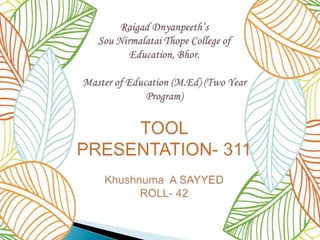TOOL PRESENTATION.pptx
- 2. Effectiveness of AI technology on the achievement of English Communication skills of IX Standard students.
- 3. 1) To plan programme for the development of communication skill of pupils in English using AI technology. 2) To implement the programme by artificial intelligence technology for the development of communication skills of English language. 3) To study the effectiveness of programme based on artificial intelligence technology on the development of English Communication skill of the pupils
- 4. • Cambridge university Artificial Intelligence programme for English Communication skill development was used • Pre test was conducted to see the level of the students later 40 hours programme was run using the artificial intelligence by the platform cambridgeenglish.org for developing communication skills. • Achievement test (Post- test), Online speaking skill assessment was taken through the Cambridge assessment pattern itself.
- 6. ÔÅΩ Survey method was use to check the acquaintance of the tool ÔÅΩ Since the Sample is a Cambridge affiliated school this research tool was appropriate available with best results as it deals with experiential learning.
- 7. ÔÅΩ Reliability and validity are concepts used to evaluate the quality of research. They indicate how well a method, technique or test measures something. ÔÅΩ Reliability is about the consistency of a measure. ÔÅΩ Validity is about the accuracy of a measure.
- 11. The interlocutor gives you three pictures and asks you to talk about two of them. You have to speak for 1 minute without interruption and the interlocutor then asks the other candidate to comment on what you have said for about 30 seconds. The other candidate receives a different set of photographs and you have to listen and comment when they have finished speaking. The questions you have to answer about your photographs are written at the top of the page to remind you what you should talk about.
- 14. Plan and Procedure for objective No. 1: Objective No. 1: 1) To plan programmes for the development of communication skill of pupils in English using AI technology ÔÅΩ Survey Method will be used. ÔÅΩ The research will use Cambridge university programme for English Communication skill development. ÔÅΩ The results will be correlated with the academic performance of the students.
- 15. Plan and Procedure for objective No.2: Objective No. 2:. 2) To implement the programme by artificial intelligence technology for the development of communication skills of English education research. ÔÅΩ For this the investigator will conducted Pre test to see the level of the students. ÔÅΩ Later 40 hours programme was run using the artificial intelligence by the platform cambridgeenglish.org for developing communication skills
- 16. Plan and Procedure for objective No.3: Objective No.3 : To study the effectiveness of programme based on artificial intelligence technology on the development of English Communication skill of the pupils ÔÅΩ Experimental Method will be used . ÔÅΩ After implementing the programme the investigator will conduct post test with the help of achievement test. ÔÅΩ Online speaking skill assessment was taken through the Cambridge assessment pattern itself. ÔÅΩ The results will be analyzed.
- 17. A pilot study can be defined as a 'small study to test research protocols, data collection instruments, sample recruitment strategies, and other research techniques in preparation for a larger study.
- 18. ÔÅΩ Pilot studies represent a fundamental phase of the research process. The purpose of conducting a pilot study is to examine the feasibility of an approach that is intended to be used in a larger scale study. ÔÅΩ the advantages of conducting a pilot study is that it might give advance warning about where the main research project could fail, where research protocols may not be followed, or whether proposed methods or instruments are inappropriate or too complicated.
- 19.  Help define the research question.  Test the proposed study design and process. This could alert you to issues which may negatively affect your project.  Educate yourself on different techniques related to your study.  Determine the feasibility of your study, so you don’t waste resources and time.
- 20. ÔÅΩ Pilot study sample(5 students) was selected by random sampling method from the targeted research sample (50 students) ACTUAL RESEARCH SAMPLE- 50 STUDENTS PILOT STUDY SAMPLE- 5 STUDENTS
- 21. PILOT STUDY OF THE RESEARCH DURATION- 5 SESSION (5 HOURS) Part 1 (Interview) Giving information about yourself and expressing your opinion about various topics. Part 2 (Long turn) Talking on your own about something: comparing, describing, expressing opinions, speculating. Part 3 (Collaborative task) Exchanging ideas, expressing and justifying opinions, agreeing and/or disagreeing, suggesting, speculating, evaluating, reaching a decision through negotiation, etc. Part 4 (Discussion) Expressing and justifying opinions, agreeing and/or disagreeing.






















